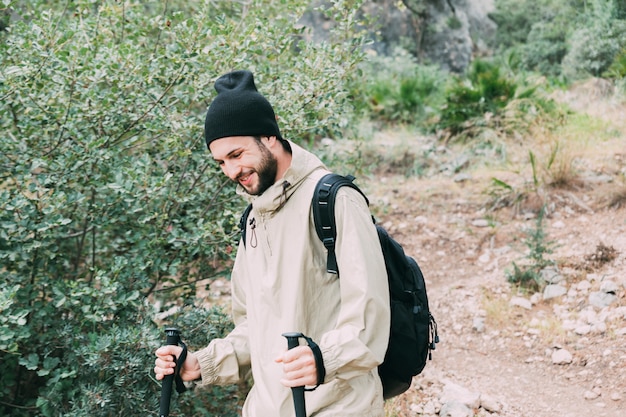
This is a guest post from Brian Groener, a 22-year-old index fund investor from Philadelphia, PA. Recently, he graduated from university and is currently working as an engineer just outside Philadelphia. Brian enjoys his job and has just started his journey towards financial independence. He is also passionate about outdoor activities and traveling, which he plans to pursue further once he achieves financial independence. He’s here to show how money can be used for freedom instead of accumulating more stuff.
There are a few things I love, and though they seem unrelated, finance and the outdoors are two of them. I didn’t develop these passions until college, but once I found them, I was hooked. After my freshman year at James Madison University in Virginia, I drove across the country to work in Yellowstone National Park for the summer. The abundant wildlife, endless hiking trails, and breathtaking views blew me away. The next summer, I studied abroad in South Africa and backpacked through Europe. After my junior year, instead of taking an internship, I lived in a tent in Wisconsin, working as a whitewater rafting guide. As graduation approached, I wasn’t thinking about getting a job; I wanted an epic adventure. With limited funds but plenty of time, I chose something that would make my money last: hiking the Pacific Crest Trail (PCT).
The PCT starts at the US/Mexico border and ends at the US/Canada border, spanning 2,650 miles and traversing landscapes from desert to mountains to forests. In early May 2016, I took my first step on this journey.
Right from the first day, within the first few hours, I realized this hike would be unlike anything I had ever experienced or imagined. Although I had done plenty of hiking and camping in college, I had never been on a trip longer than three days. Completing the PCT would take about 5-6 months.
My daily routine involved waking up around 6 AM, having breakfast, hiking until noon, eating lunch, hiking again until 3 or 4 PM, setting up camp, eating dinner, and relaxing. About once a week, I had to resupply my food in the nearest town, often hitchhiking to get there. I never imagined myself hitchhiking, but when faced with the choice of hitchhiking or going hungry, you quickly adapt and surprise yourself with what you can do.
A little over a month in, the mental toll started to wear me down. The initial excitement had faded, and I questioned if I really wanted to spend another five months doing this. My parents visited me, which I thought would be a much-needed reset. Instead, having time off the trail gave me too much time to think, and I couldn’t get myself to go back. I ended my hike just shy of Yosemite National Park, having covered over 700 miles in about five weeks. Nowadays, I often have flashbacks of the trail at work and can’t believe I willingly stopped. I’d choose the trail over work any day.
So, what does any of this have to do with money? I’m glad you asked.
The biggest lesson I learned on the trail is appreciation. Appreciation for water, people, heat and air conditioning, cars, everything. In everyday life, we often feel entitled to these things and take them for granted. On the trail, I lived an amazing life with just the 25 pounds of gear on my back and spent next to nothing; my only expense was food.
We often become attached to material things that don’t make our lives any better or happier. We forget the difference between what we need and what we want. The fact is, you can live a good life with a lot less than you think.
One of the most important lessons I’ve learned from my outdoor adventures is that the people we surround ourselves with have profound impacts on our lives. The great thing is, friendships are free.
The less we need to live on and the more awesome people we surround ourselves with, the better. Your life will be less cluttered with stuff, you’ll make more meaningful memories, and you’ll be closer to financial independence. After all, if you can live on $10,000 a year, you’d only need around $250,000 to retire. If you need $100,000 a year, you’re looking at more like $2.5 million. On an average salary of $50,000 a year, that’s the difference between retiring at 30 and retiring at 65. I value freedom much more than my possessions. How about you?
